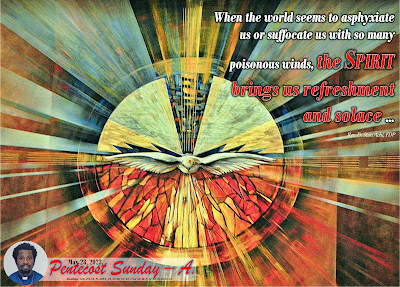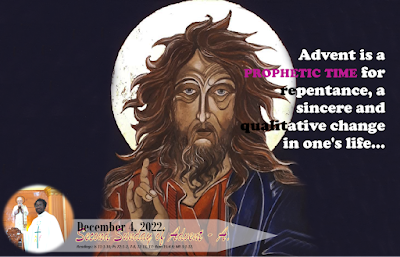BREATH OF GOD.
May 28, 2023.
Pentecost Sunday – A.
Readings: Acts 2:1-11; Ps 104:1, 24, 29-30, 31, 34; 1 Cor12:3b-7, 12-13; Jn 20:19-23.
“… He breathed on them and said to them, “Receive the Holy
Spirit” …” Jn 20:22
A Bantu proverb says: “Life is your ability to breath out
every time you breathe in.” And a Thai proverb adds: “Don’t borrow someone
else’s nose to breathe with.”
There is a beautiful psalter hymn we sing every first and
third Sunday while praying the midday liturgy of hours. It was composed by
Edwin Hatch. It goes this way: "Breathe on me, Breath of God, fill me with
life anew, that I may love the way you love, and do what you would do. Breathe
on me, Breath of God, until my heart is pure, until my will is one with yours,
to do and to endure. Breathe on me, Breath of God, so shall I never die, but
live with you the perfect life for all eternity."
The Holy Spirit is that Divine Breath that comes to breathe
on us and give us life. When the world seems to asphyxiate us or suffocate us
with so many poisonous winds, the Spirit brings us refreshment and solace.
Breathing is vital. Without air in our lungs, we are doomed
to die. A few years ago, there was a tragedy in the USA that raised a chain of
reactions in the whole world against racism and racial discrimination.
#BlackLifeMatter and #ICanBreathe. This was consecutive to the brutal
assassination of a black man by a Policeman. "I can't breathe." Three
words that were uttered by George Floyd as his life was extinguished beneath
the knee of a police officer. But that did not move the police officer to show
compassion. Then we all realize how a man can be cruel but also how what we
often take for granted is vital. Deprived of the capacity of breathing, we turn
into crops and lifeless bodies. God's Spirit is given to us to breathe and live
fully our Christian identity and mission.
We are celebrating today the Pentecost, and the Church says:
"On the day of Pentecost when the seven weeks of Easter had come to an
end, Christ's Passover is fulfilled in the outpouring of the Holy Spirit,
manifested, given, and communicated as a divine person: of his fullness, Christ,
the Lord, pours out the Spirit in abundance." CCC 731 So, this is clear,
Easter is over today. The Spirit is given to us. Our mission begins. We are
called to let this Breath of God breathe in us and lead us to insufflate the
world with the Good News of Christ, bringing life through him who gives life.
Today begins our mission as a Church, a community of believers in Christ. The
Holy Spirit is given to be the Breath and the new and unique Law of the
Christian.
In the first reading we hear about the event that took place
in the Cenacle of Jerusalem, how the Spirit descended on the community gathered
there, and filling them with his presence, made them preach the Good News in a
variety of languages. This event has the singularity of bringing a new wind, a new
breath to the community of believers. From a fearful and hidden community, they
will get out and proclaim Jesus broadly. This was made possible only because of
the Breath of God that breathed on them.
This narrative of Luke will get a complementary line in the
Gospel of John. There, the Spirit is given a particular mission, be the Law of
the community of believers. The Holy Spirit is the new law and the force that
leads to doing good. He is the cause, and source of unity among believers. He
tears down all barriers of divisions and discrimination and whatever leads to
sin.
In the Johanic narrative, the Holy Spirit is given by Jesus
to his disciples on the very evening of his Resurrection. The tragedy of the
Good Friday and the death of the Lord had left the disciples troubled and
fearful. In their fear of the Jewish Leaders, they had no other choice but to
close themselves in a quite secure place, locking all doors. And that is where
the Risen Lord appears to them. The first thing he gives them is a deep inner
solace: peace. "Peace be with you." He said. Fear has taken away
their peace and strength to face life after Jesus. The Resurrection and
apparition of the Lord are meant to restore them to that peace. Then comes the
second and greatest gift that not only will ring them out from the Cenacle, but
also make them missionaries of mercy, love, and peace, the gift of the Holy
Spirit. The Lord, St. John says, breathed on.
The Lord Jesus did something very remarkable: “He breathed
on them.” Through his profound breath on them, the Lord has communicated
something of astonishing and fathomless profundity. He has given them a gift
that will change their lives and give them strength and vigor. Breathing
invigorates and revives. When someone is drowning in deep water, what we do is
reanimate them through a deep breath. Sometimes even breathing in their mouth.
That is what the Lord did. To the desperate and drowning disciples, he gave a
new breath. He breathed on them. Then he said: "Receive the Holy Spirit.
For those whose sins you forgive, they are forgiven; for those whose sins you
retain, they are retained."
Literally, the apostolic life and the mission of the
disciples and consequently of the Church begins here, at that very moment.
Through the breath of the Lord, all things are renewed, and strength is given
for the mission.
The second reading describes the consequence of the presence
of the Holy Spirit in the disciples. The first and greatest work of the Spirit
is unity in diversity. Paul says to the Corinthians: "There are varieties
of gifts, but the same Spirit; and there are varieties of service, but the same
Lord; and there are varieties of working, but it is the same God who inspires
them all in everyone." Our
diversities and differences are not meant to divide or oppose us but make us
complementary. Races, origins, colors, languages, or any other kinds of
diversities are aimed to enrich us.





Comments
Post a Comment